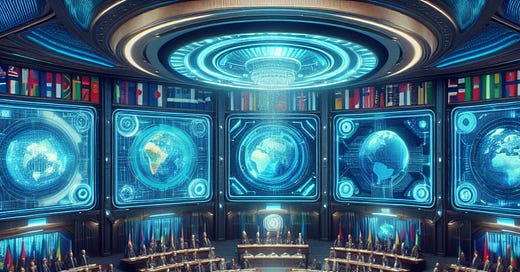The West Must Relearn Diplomacy After ‘Rules-Based Order’ Atrophy
It is about recognizing that the strength of the West lies not in its ability to impose neocolonial rules masquerading as diplomacy.
As the flow and the 'quanta' of power change, diplomacy undergoes a significant transformation because of these shifts in the geopolitical and geoeconomic environment. The historical period of Western dominance, characterized by a unipolar power structure with the United States at its apex, is now giving way to a more multipolar world order. The present article explains how the West which had been accustomed to a position of comfort and influence, defacto rigging international relations into obeying pro-US bias, must now adapt to a reality where power no longer resides on a single state’s architecture but flows between the various superpowers and regional powers.
The West's diplomatic institutions and practices desperately require a more cooperative and peaceful international framework where all geoeconomic blocs can interconnect and work together. It would offer an opportunity to move beyond a facade of pax Americana diplomacy and towards a more authentic and constructive engagement with the world. As the global power dynamics continue to shift in the transition towards multipolarity, the ability to adapt and learn will be crucial for any state seeking to maintain relevance and foster positive global relations.
The post-World War II era saw the establishment of a 'Rules-Based Order,' which, while successful in its time, appears increasingly inadequate in addressing the multiplexities of contemporary international relations. The diplomatic world is undergoing a significant transformation as the geopolitical and geoeconomic underpins shift. The multipolar age is defined by diplomacy fundamentals, as actors, each with their own interests and modes of engagement compete on the global stage.
The concept of a 'rules-based order' has been a cornerstone of Western diplomacy, advocating for a system where international law and norms govern state actions. However, recent geopolitical shifts have exposed that the US and Europe suffer from diplomatic atrophy that necessitates a reinvigoration of diplomatic strategies. The US-led West predicament is double, it is not merely that 1) the US is declining in geoeconomic prowess, nor that 2) its old perceived communist foes revamped their economies into commercial juggernauts but both at once. The West is facing the rise of BRICS dynamics and thus must adapt to a landscape where power is more diffused and where unipolar actions are less possible and also carry the possibility of being counterproductive.
Western states must revisit the foundational texts of diplomatic theory in their Political Science and International Relations curriculum, critically analyzing their standard interpretations, and recontextualizing them to better align with the current geopolitical environment. This process involves not only a theoretical deconstruction of how EU-EU institutions went astray but also a practical reapplication of diplomatic principles that are sensitive to the nuances of a multipolar world.
The relearning process could involve embracing a more inclusive and flexible approach to diplomacy, one that recognizes the legitimacy of different cultural and political frameworks. It will also require a willingness to engage in genuine dialogue and build consensus, rather than imposing a singular vision of international order. Furthermore, the West should consider diversifying its diplomatic toolkit, incorporating elements of public diplomacy and soft power, as these can be particularly effective in a world where hard power alone is insufficient to secure long-term cooperation and stability.
This possible renaissance of Western diplomacy should acknowledge past oversights and be open to learning from the experiences and practices of other nations, especially those that have historically been on the periphery of global decision-making. The utility of this approach is that Western states can then recalibrate their political systems to be able to compete in the global markets again while being effective in the multipolar system of international relations.
Western nations must strengthen geoeconomic partnerships and forge new ones, transcending traditional ideological divides. With a commitment to abandon the 'rules-based order' imperial playbook and build an architecture where international institutions are leveraged not merely as arenas for asserting dominance but as platforms for dialogue and problem-solving. In this context, the United Nations and other international organizations may regain prominence as indispensable forums for mediating disputes and fostering cooperation. In essence, the recalibration of Western diplomacy into a multipolar world is all about abandoning the rules-based order fiasco for a more inclusive and adaptable approach. It is about recognizing that the strength of the West lies not in its ability to impose neocolonial rules masquerading as diplomacy.



